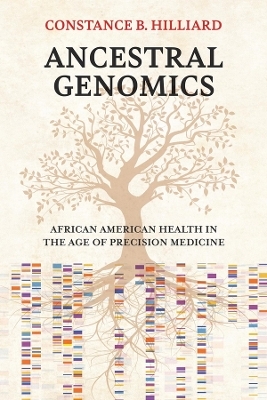
Ancestral Genomics
African American Health in the Age of Precision Medicine
Seiten
2024
Harvard University Press (Verlag)
978-0-674-26860-9 (ISBN)
Harvard University Press (Verlag)
978-0-674-26860-9 (ISBN)
Race is a social reality, not a biological one. Yet African Americans are poorly served by even advanced genetic medicine because it is built on European DNA. Constance Hilliard explores the benefits and drawbacks of racial heuristics in medicine and argues for nonessentializing methods of harnessing genomic science on behalf of people of color.
A leading evolutionary historian offers a radical solution to racial health disparities in the United States.
Constance B. Hilliard was living in Japan when she began experiencing joint pain. Her doctor diagnosed osteoarthritis—a common ailment for someone her age. But her bloodwork showed something else: Hilliard, who had never had kidney problems, appeared to be suffering from renal failure. When she returned to Texas, however, a new round of tests showed that her kidneys were healthy. Unlike the Japanese doctor, her American primary care provider had checked a box on her lab report for “African American.” As a scholar of scientific racism, Hilliard was perplexed. Why should race, which experts agree has no biological basis, matter for getting accurate test results?
Ancestral Genomics is the result of Hilliard’s decade-long quest to solve this puzzle. In a masterful synthesis of evolutionary history, population genetics, and public health research, she addresses the usefulness of race as a heuristic in genomic medicine. Built from European genetic data, the Human Genome Project and other databases have proven inadequate for identifying disease-causing gene variants in patients of African descent. Such databases, Hilliard argues, overlook crucial information about the environments to which their ancestors’ bodies adapted prior to the transatlantic slave trade. Hilliard shows how, by analyzing “ecological niche populations,” a classification model that combines family and ecological histories with genetic information, our increasingly advanced genomic technologies, including personalized medicine, can serve African Americans and other people of color, while avoiding racial essentialism.
Forcefully argued and morally urgent, Ancestral Genomics is a clarion call for the US medical community to embrace our multigenomic society.
A leading evolutionary historian offers a radical solution to racial health disparities in the United States.
Constance B. Hilliard was living in Japan when she began experiencing joint pain. Her doctor diagnosed osteoarthritis—a common ailment for someone her age. But her bloodwork showed something else: Hilliard, who had never had kidney problems, appeared to be suffering from renal failure. When she returned to Texas, however, a new round of tests showed that her kidneys were healthy. Unlike the Japanese doctor, her American primary care provider had checked a box on her lab report for “African American.” As a scholar of scientific racism, Hilliard was perplexed. Why should race, which experts agree has no biological basis, matter for getting accurate test results?
Ancestral Genomics is the result of Hilliard’s decade-long quest to solve this puzzle. In a masterful synthesis of evolutionary history, population genetics, and public health research, she addresses the usefulness of race as a heuristic in genomic medicine. Built from European genetic data, the Human Genome Project and other databases have proven inadequate for identifying disease-causing gene variants in patients of African descent. Such databases, Hilliard argues, overlook crucial information about the environments to which their ancestors’ bodies adapted prior to the transatlantic slave trade. Hilliard shows how, by analyzing “ecological niche populations,” a classification model that combines family and ecological histories with genetic information, our increasingly advanced genomic technologies, including personalized medicine, can serve African Americans and other people of color, while avoiding racial essentialism.
Forcefully argued and morally urgent, Ancestral Genomics is a clarion call for the US medical community to embrace our multigenomic society.
Constance B. Hilliard is Professor of History at the University of North Texas. She is the author of several books, including Straightening the Bell Curve: How Stereotypes about Black Masculinity Drive Research on Race and Intelligence.
| Erscheinungsdatum | 27.03.2024 |
|---|---|
| Zusatzinfo | 1 Maps |
| Verlagsort | Cambridge, Mass |
| Sprache | englisch |
| Maße | 140 x 210 mm |
| Gewicht | 376 g |
| Themenwelt | Studium ► 2. Studienabschnitt (Klinik) ► Humangenetik |
| Naturwissenschaften ► Biologie ► Genetik / Molekularbiologie | |
| Sozialwissenschaften ► Ethnologie | |
| Sozialwissenschaften ► Soziologie | |
| ISBN-10 | 0-674-26860-1 / 0674268601 |
| ISBN-13 | 978-0-674-26860-9 / 9780674268609 |
| Zustand | Neuware |
| Informationen gemäß Produktsicherheitsverordnung (GPSR) | |
| Haben Sie eine Frage zum Produkt? |
Mehr entdecken
aus dem Bereich
aus dem Bereich
Die revolutionäre Medizin von morgen (Lifespan)
Buch | Softcover (2020)
DuMont Buchverlag
CHF 22,40
Eine sehr persönliche Geschichte | Der New York Times-Bestseller
Buch | Softcover (2023)
Ullstein Taschenbuch Verlag
CHF 30,75
Buch | Softcover (2022)
John Wiley & Sons Inc (Verlag)
CHF 169,95


